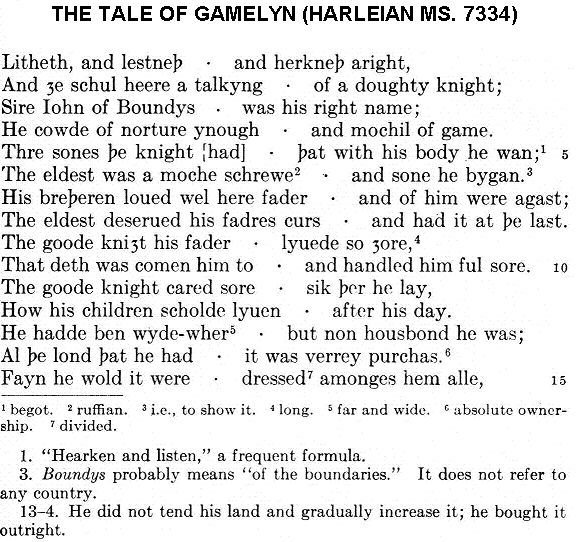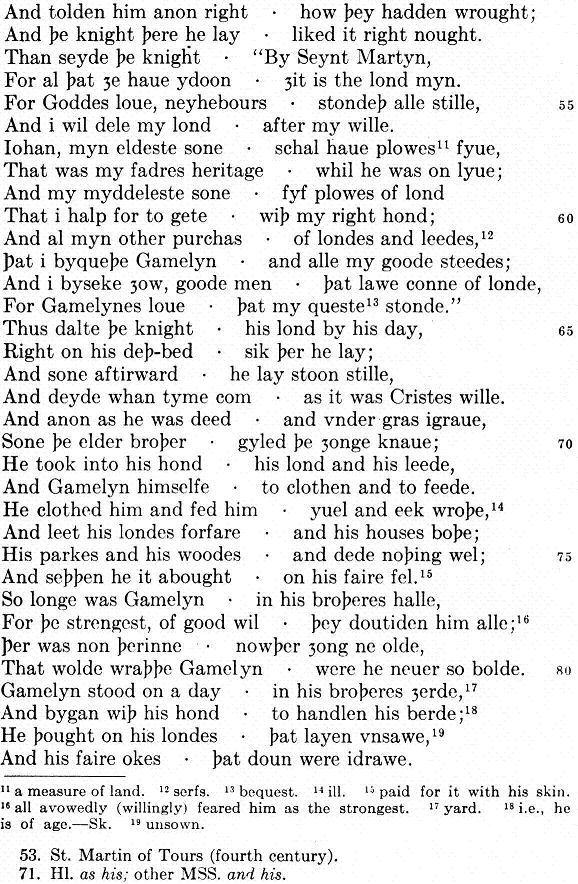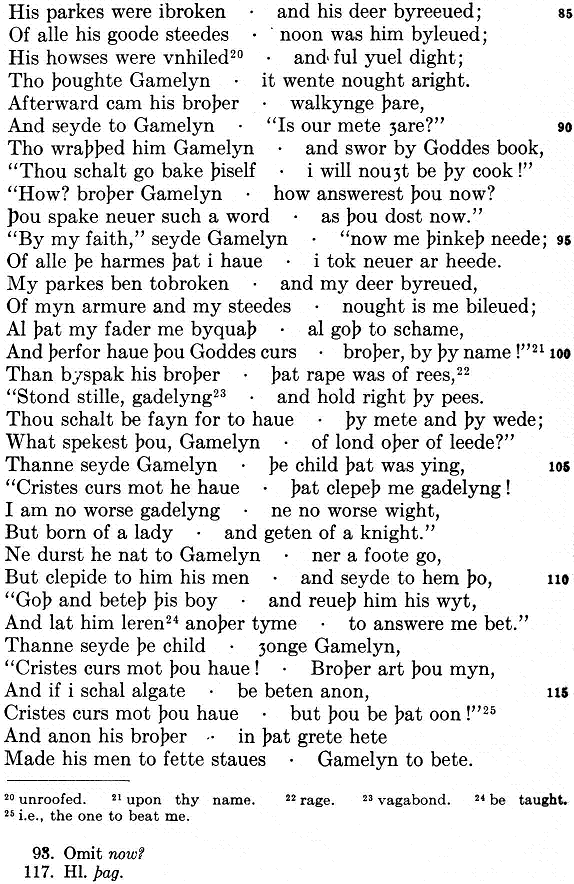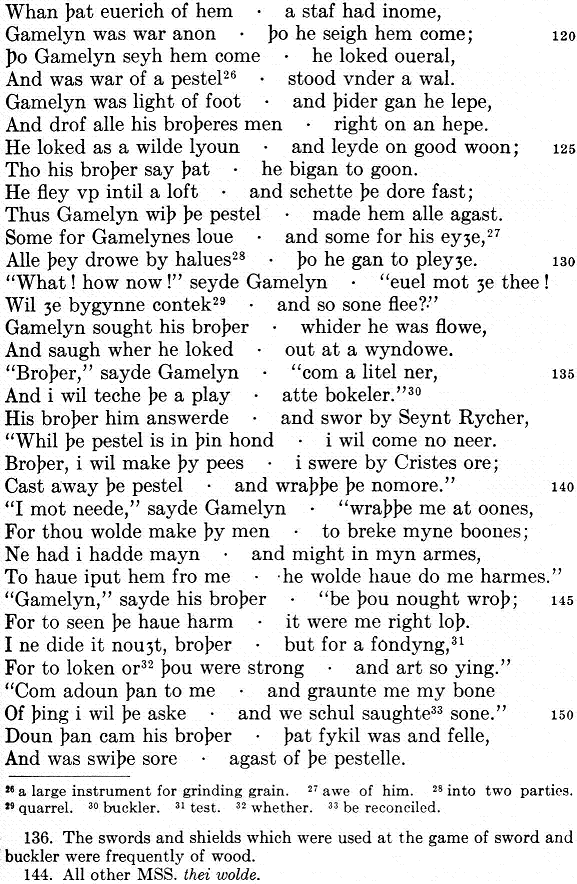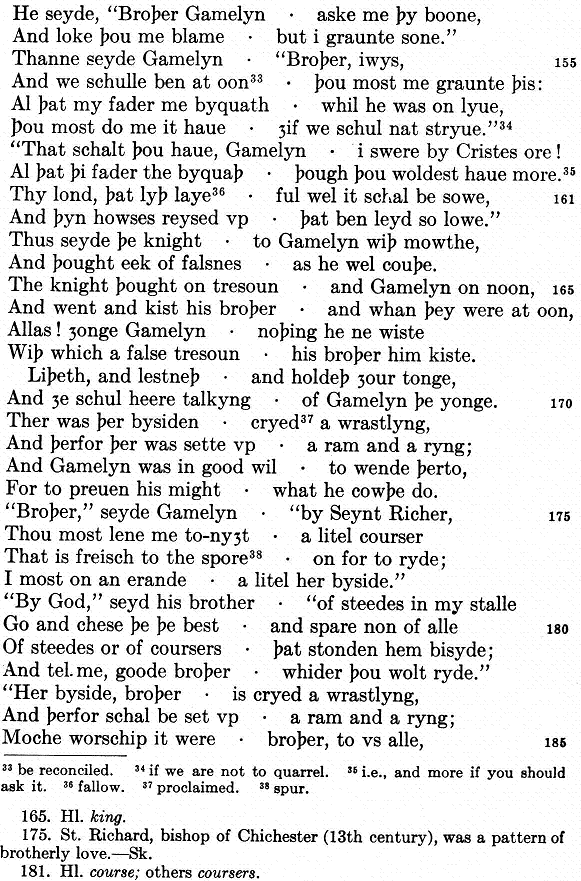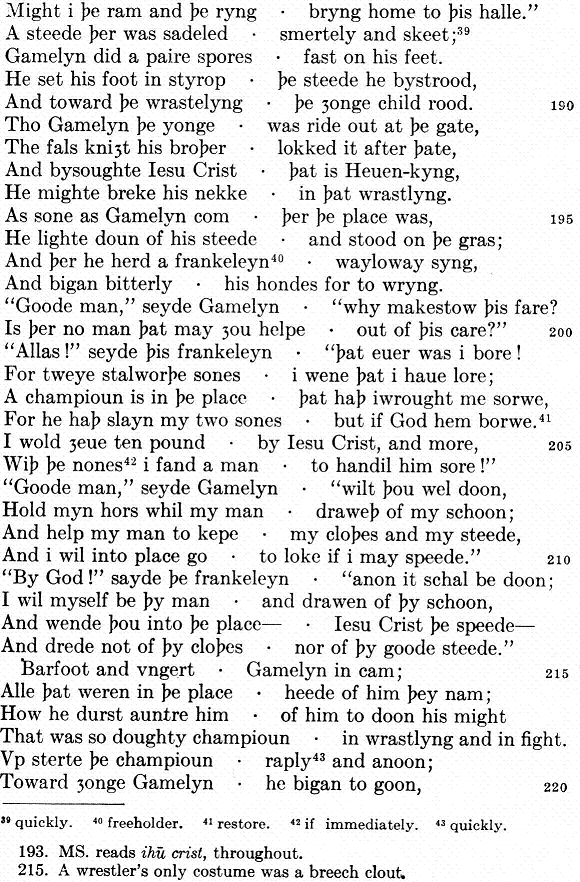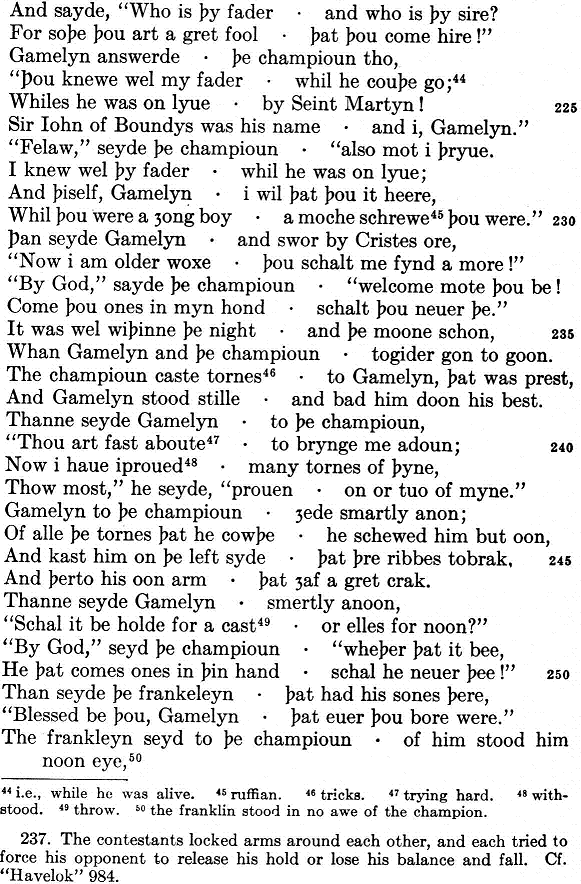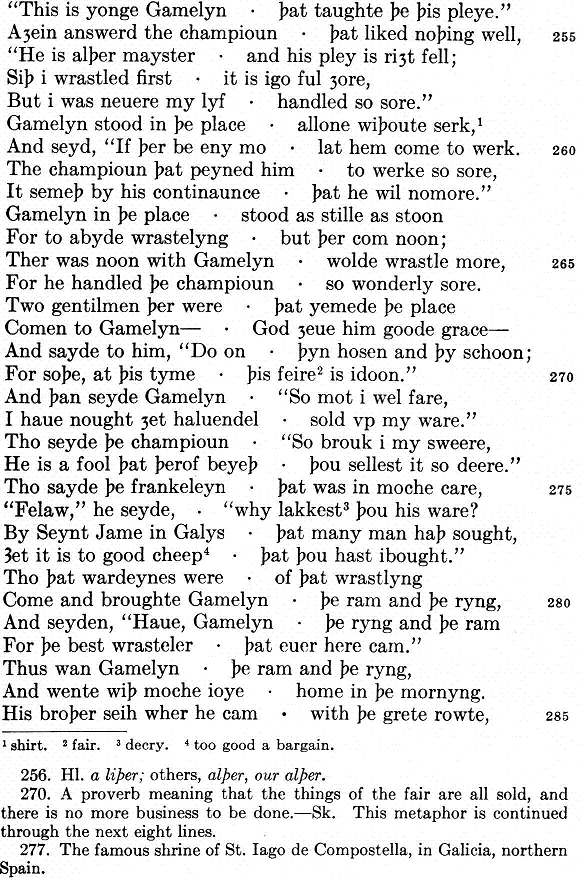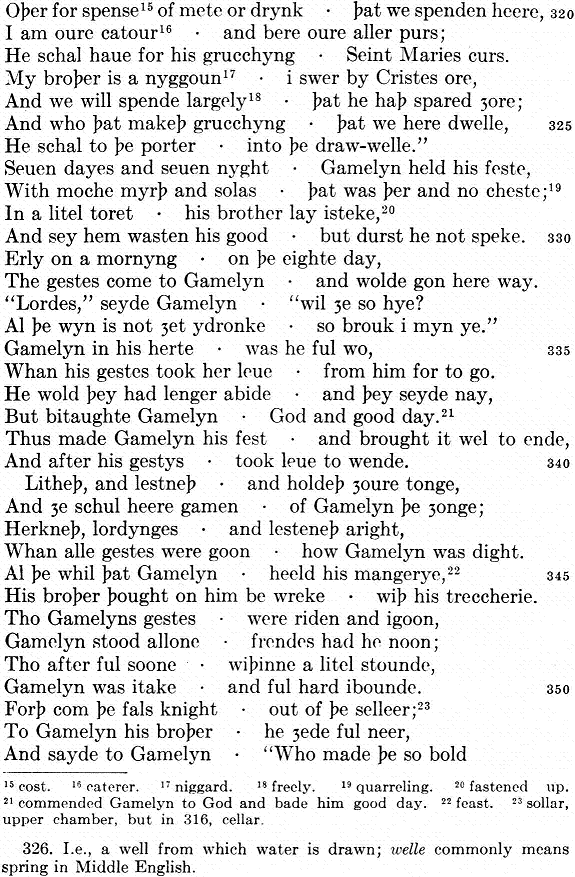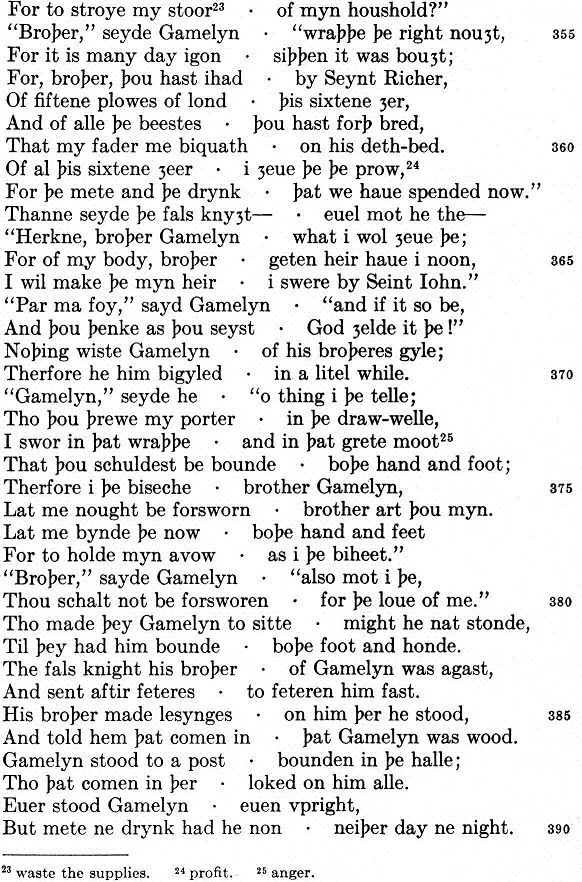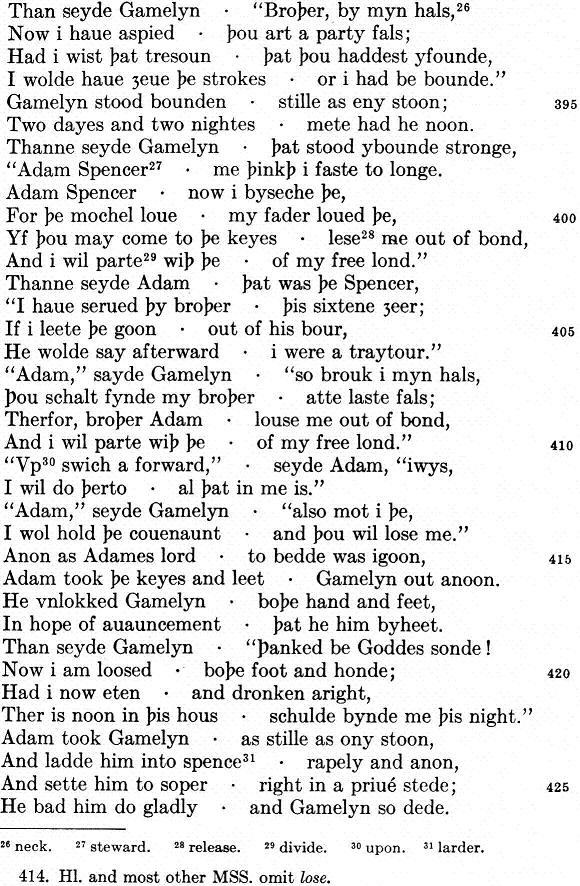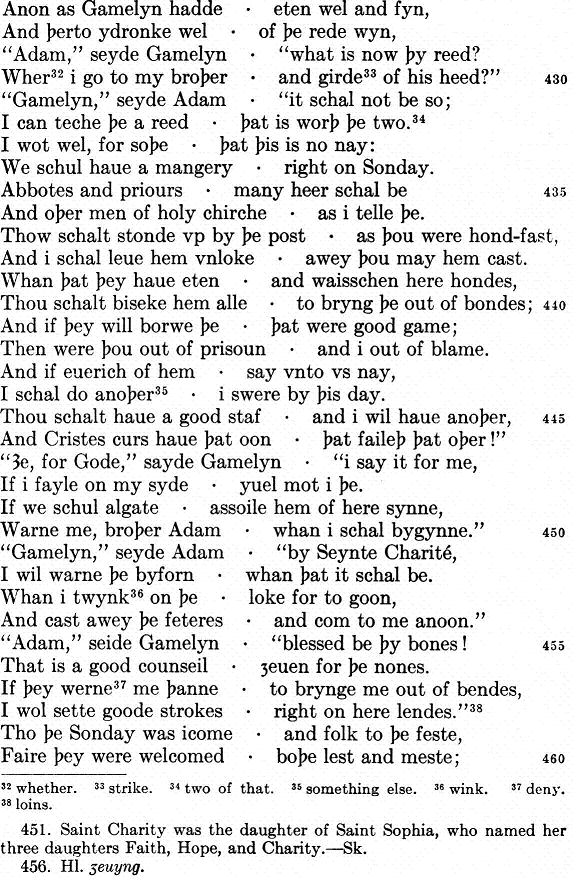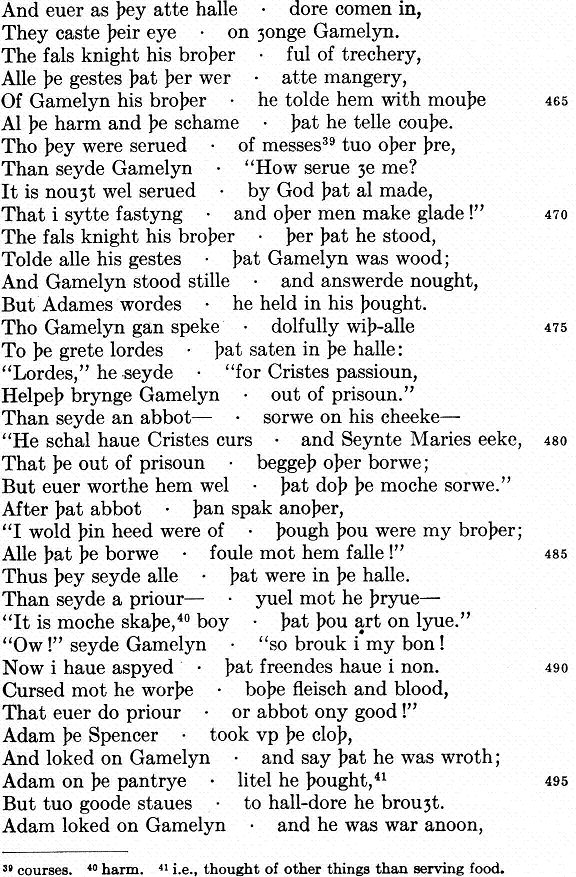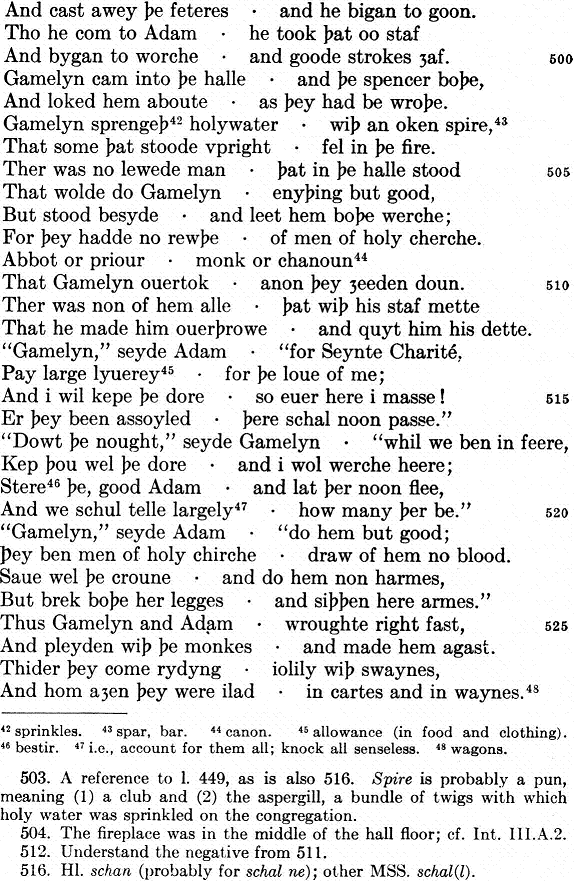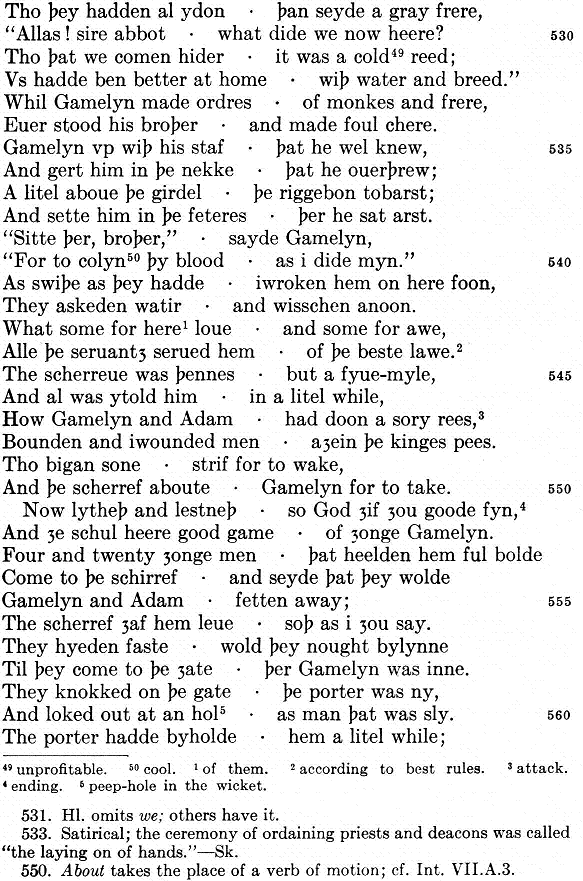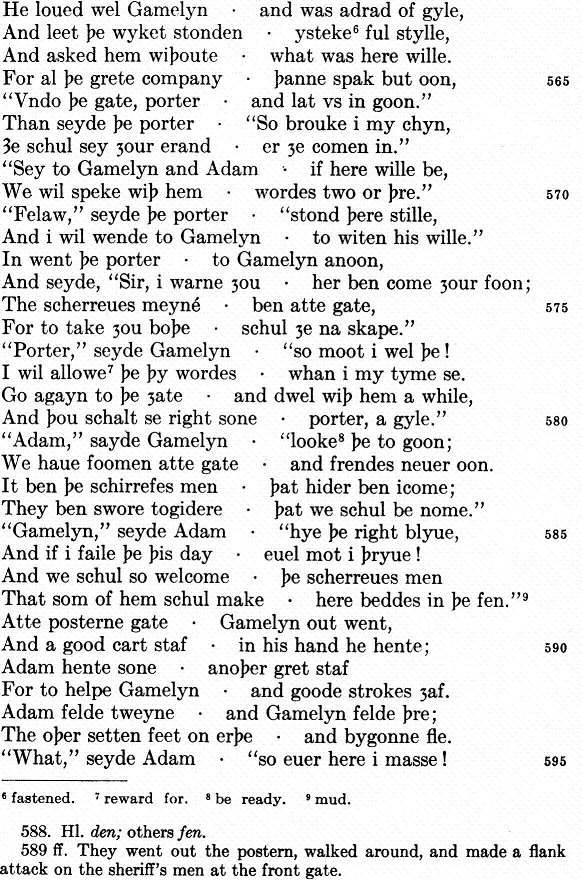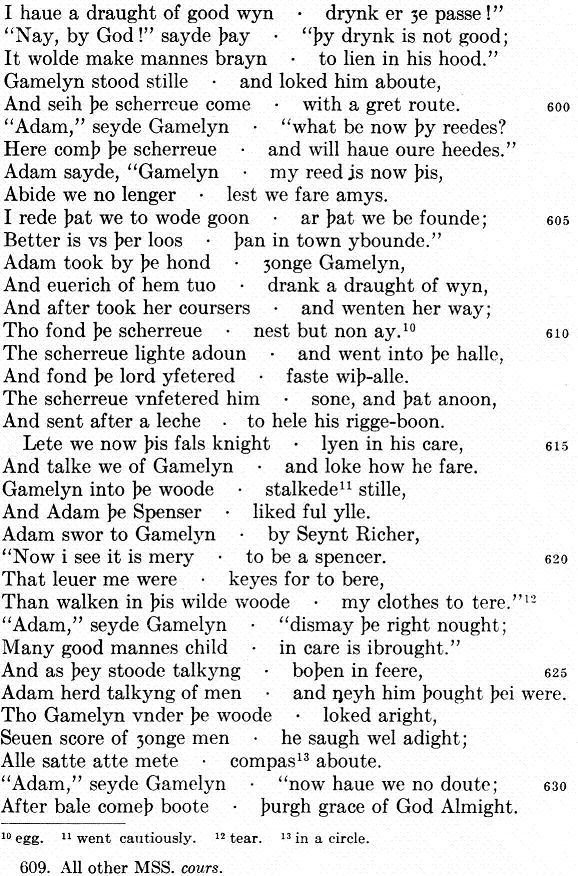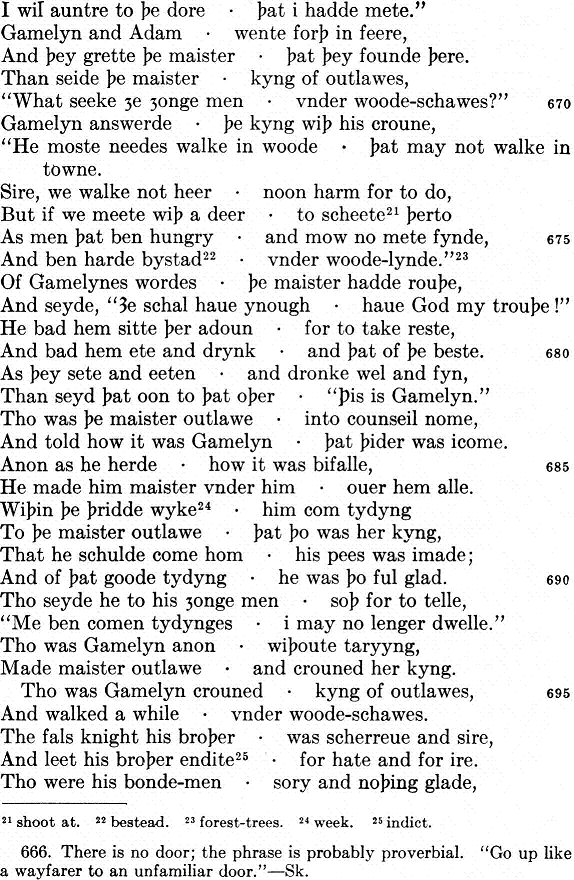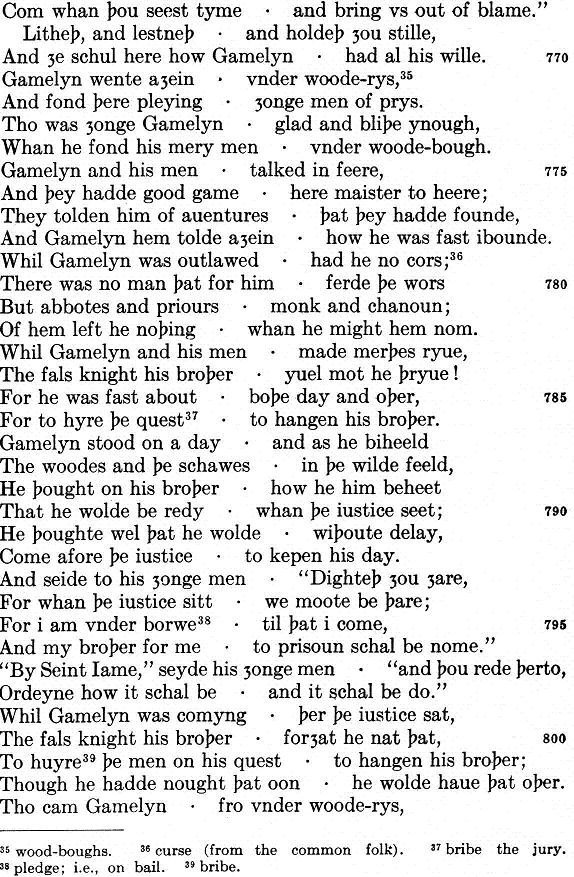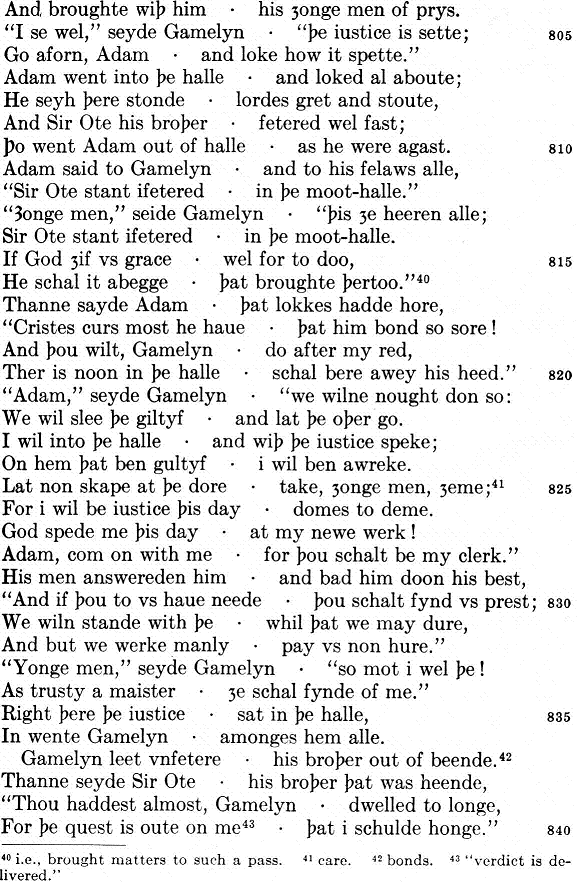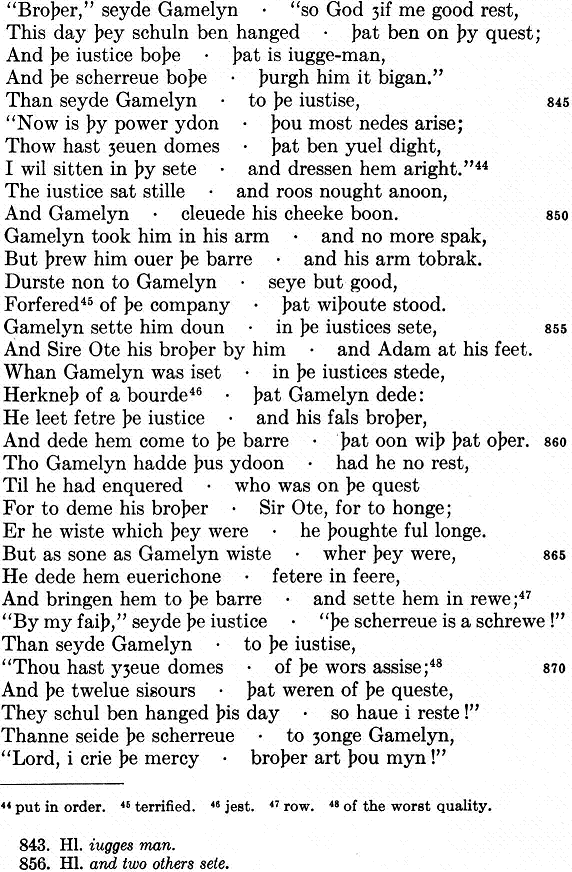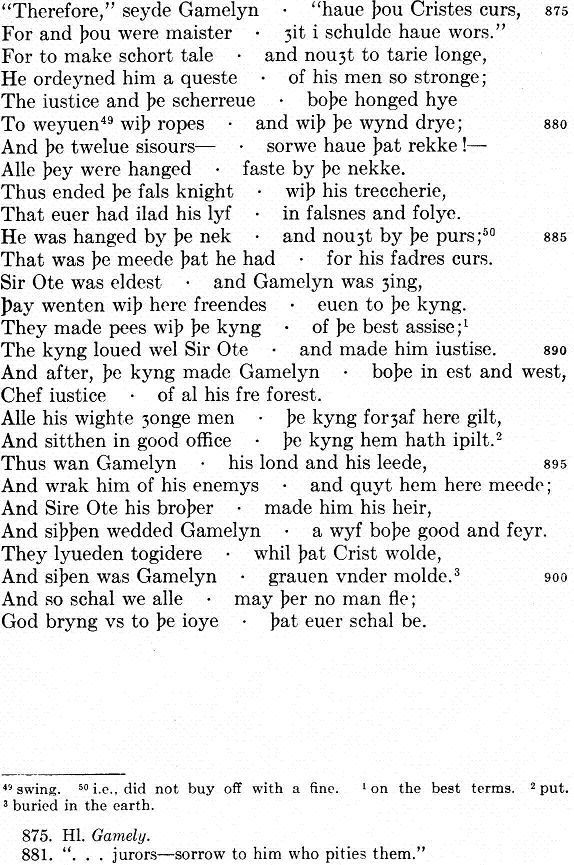The Tale of Gamelyn
The Tale of Gamelyn is regarded as the oldest surviving outlaw tale written in English, and one of the most ferocious and violent of the outlaw legends. Similar traditional stock and situations can be seen in The Gest of Robyn Hode: the animosity between the sheriff and the outlaw, the pardon obtained from the King, the deprivation of land by the scheming of evil men, even a similar scene at a wrestling match with a similar prize. In addition to this, the King, Sheriff, Porter, Justice, Prior and Abbot, are characterized in both tales.(1) Like Robin Hood the outlaw Gamelyn has his ‘mery men’ and he robs men of the church.
As Keen points out, the two stories differ in literary form, the Tale of Gamelyn would technically be called a metrical romance, whereas the poems about Robin Hood are ballads.(2) As Skeat has mentioned, ‘the variableness of the metre renders the poem difficult to scan, and in some places raises doubts as to the grammatical force of the final –e. But the grammar will be found to resemble that of Chaucer rather closely, though it is in some points less regular, being of a somewhat more Northern character.’(3) The dialect has been identified as North Midlands, or possibly North East Midlands, which could imply Nottinghamshire, but this does not prove that the forest in which Gamelyn becomes an outlaw is Sherwood. There are a number of words of Scandinavian origin, which could suggest a Danelaw influence, perhaps Lincolnshire(4) or even Leicestershire, the area associated with the notorious outlaw activities of the Folvilles.
Gamelyn was written in about the middle of the fourteenth century, and it survives in twenty-five early manuscripts, however there is division between scholars as to whether it was popular. The poem was added to a version of The Canterbury Tales where it follows the unfinished Cook’s Tale. It is likely that Chaucer himself had included Gamelyn among his papers, his intention may have been to rewrite it for one of his own characters, in any case it is generally agreed that Chaucer had no hand in the tale.
The source of the text and the origin of its content remain uncertain, although Skeat has noted some similarity in story with the Lay of Havelok the Dane, and some similar wording in A Poem on the Times of Edward II, a version of which appears to have been written in the beginning of the reign of Edward III. He has also suggested that the name Gandeleyn which appears in the ballad entitled ‘Robyn and Gandeleyn’, is a corruption of Gamelyn. Furthermore he believed that Gamelyn was the inspiration for the young Gamwell who appears in the ballad Robin Hoods and the Stranger, he also noted that Thomas Lodge, had used Gamelyn as a source for his novel Euphues Golden Legacy; Shakespeare adapted Lodge’s romance to give the plot to As You Like It.(5) Prideaux (1886) felt that the romance of Fulk fitz Warin was close to Gamelyn’s text but there is no apparent similarity in detail between the two. Academics have linked Gamelyn to other heroic tales; W.F. Schirmer thought there was a Germanic influence from tales such as King Horn, Havelok and Athelstan. Another connection was made by Ramsey, who identified Gamelyn along with Athelstan, Raoul of Cambrai, Foulk le Fitz Warin, and the Song of Lewes as ‘rebel romances.’ Unlike the Gest, no place names are mentioned, but there can be no doubt that both were intended for an audience as both call the audience to attention.
1. The most mysterious character in Gamelyn is the nameless ‘master outlaw’ who lives in a nameless wood.
2. Maurice Keen, The Outlaws of Medieval Legend, (Routledge & Kegan Paul Ltd, 1977) p. 79.
3. Walter W. Skeat, The Tale of Gamelyn, (Oxford 1893), introduction p. xxiii.
4. The Lay of Havelock the Dane (ed. Skeat) is clearly connected with Lincolnshire.
5. Walter W. Skeat, The Tale of Gamelyn, (Oxford 1893), introduction, pp. xi, xii, ix, x, xvii, xviii.
The Tale of Gamelyn is the story of a younger son, left at his father’s death in the care of a wicked elder brother, who seeks to cheat him out of his inheritance. The tale opens with the old knight Sir Johan of Boundys on his death-bed. He knows his end is near, and he has called his neighbours so that in their presence, he may divide his lands among his three sons. He knows that his neighbours will try to cheat the young Gamelyn of his share, but the old man is determined to have his own way:
| ‘Then seyde the knight I sware by Seynt Martin, |
| For al that ye have y-doon yit is the land myn.’ |
With his last words he divides all his lands; five ploughlands to the eldest son, five more to the second, and all that remains will go to Gamelyn. The neighbours leave, Sir Johan dies, and Gamelyn is left at the mercy of his eldest brother. Gamelyn grows up in his brother’s hall, and while his lands were held in ward by his brother, they were wasted and have gone to ruin. He grows up tall and strong, and as he stands in his brother’s yard one day, he begins to think of his wasted lands, and he becomes determined to claim his inheritance. He seeks out his brother, and there begins their long and furious quarrel. They argue over his inheritance, then the elder brother calls his men to bind and beat the boy, however Gamelyn attacks them with a pestle then shuts himself in the hay loft. There he threatened to break every bone in the body of any who came near him, unless his brother will give him back his land. Realizing he is beaten for the moment, the brother in his cunning tells Gamelyn he only wished to try his strength, and if he would live with him he would have his land, his kiss of peace, and more:
| ‘Thy land, that lyth laye, full wel it schal be sowe, |
| And thyn houses reysed up, that ben layd so lowe’ |
So Gamelyn has his peace and his land, and for the moment they live happily together.
Soon after a wrestling was cried in the country, and ‘there was set up a ram and a ryng’, the traditional prize for the man that could overthrow the champion. Gamelyn makes a decision to try his luck, and as he tells his brother, it will bring great worship to the family if he can return with the trophies. Gamelyn sets off, but as he nears the spot, he meets a poor franklin weeping, who tells him that the wrestling champion has slain his two sons. Gamelyn makes a promise to avenge him, so he leaves his horse and his shirt with the franklin and hurries to the ring. He easily beats the champion and is presented with the ram and the ring ‘for the best wrasteler that ever here came.’ He thanks the wardens for his prize, then proceeds to invite all at the fair to accompany him home to celebrate his triumph in the hall.
Gamelyn had not reckoned on his brother’s reactions, he had hoped that a broken neck would solve the family problems, and he has no intention of entertaining the mob at his home. When he sees the ‘rowte’ in the distance he tells his porter to bar the gate and to let no man pass. Gamelyn kicks down the door, breaks the fleeing porter’s neck, and throws his lifeless body into the well in the courtyard. He then goes to the gate and opens in wide:
| ‘He let in alle maner men that goon in wold or ryd, |
| And seyde ‘Ye be welcome, withouten eny greeve, |
| For wee will be maistres here and aske no man leeve’ |
Five tuns of wine are broached, and Gamelyn swore that none should leave while a drop was left. The feast lasted seven days and nights, and at the end, Gamelyn farewells his guests and proceeds to fetch his brother who had taken refuge in the cellar. The brother tells Gamelyn that he will make him his heir, but to avenge the death of his porter, and to preserve his honour, he asks that Gamelyn allow himself to be bound hand and foot. Gamely naively agrees and is therefore fettered to a post in the dining-hall where he stands without food, for all to mock. He turns to Adam the Spencer, who makes a promise to bring him food and loosen his bonds. Adam had been his father’s man, and he has more to add to the plan. He tells Gamelyn that his brother has arranged a feast for the next Sunday; all the great churchmen will be there, but before they come, Adam has promised to unlock Gamelyn’s fetters. In the middle of the meal it is planned that the churchmen should speak to Gamelyn’s brother on his behalf; in which case, Gamelyn would be free and no suspicion need fall on Adam. But if they would not, then Gamelyn should, when Adam gave the sign, throw away his fetters, and then:
| ‘Thow schalt have a good staff and I wil have another, |
| And Cristes curs have that oon that faileth that other.’ |
When the day arrived, the abbots and Gamelyn’s brother sat at meat; Gamelyn stood tethered at the end of the hall; his brother told them he was mad, and to his appeals they replied with solemn curses. Meanwhile Adam had fetched two staves and brought them to the door; suddenly the prisoner threw aside his fetters, and the guests found themselves facing two angry men armed with clubs. There was no one to help them; Gamelyn had always been the champion of the servants, and they had no intention of helping an oppressive master and his associates, even though they were churchmen. Gamelyn and Adam attacked the guests and not a man escaped unhurt:
| ‘Thider they came rydyng jolily with swaynes, |
| But home agen they were y-lad in cartes and waynes.’ |
With one blow Gamelyn felled his brother, then set him in his own fetters to ‘cool his blood’, while the servants brought him all the best fare in the house. While Gamelyn was celebrating his release, word had been sent to the sheriff of the affair, and four-and-twenty men had formed a posse to capture the offenders. Gamelyn was informed of their coming by his new porter who ran in with the news that there were foemen at the gate. He and Adam drove away the first group, but soon they saw a great rout coming with the sheriff at their head, it was time to leave. While the sheriff was searching the house and attending to Gamelyn’s brother, the two fugitives were running through the woods. In the forest they came upon a group of outlaws, and as they peered under the branches of a tree, they saw the ‘master outlaw’. At first the outlaws took them for the law’s spies, and seven men brought them before their ‘king’. Gamelyn assured him that they were also on the run, so he made them join with his men at their meal. The master outlaw enrolled them in his band, and before long Gamelyn was made master under him.
They were with the outlaws for less than three weeks when the news came that their master’s friend had a pardon for him from the king. He took his leave and returned to his land, and Gamelyn was crowned King of the outlaws in his place. Meanwhile his outlawry was made public; his brother was healed of his broken back, and for the new term he himself was made sheriff. Gamelyn’s lands were seized, and in accordance with law, his peasants paid fine to the sheriff, as they would to a new lord when the old died, for to the law, Gamelyn was now dead. However, he was a lord they loved, and the new master was harsh; so his bondmen kept their loyalty to him and he was informed of how things stood with him and his land. Gamelyn regretted that he had not killed his brother, and the welfare of his peasants and their wives he could not overlook. He swore that he would be at the next shire court to uphold their cause, and he was as good as his word.
Gamelyn went to the shire court alone, and as an outlaw he had no right at law (it is clear that the author of this poem knew the law quite well): when he walked into the ‘moot hall’, he had put himself in the sheriff’s power. He had no right to speak in his own defence, he was allowed no chance to; he was bound and fettered and cast into the sheriff’s prison to await the assize. Although he was in the sheriff’s power, he still had some use of the law; he had another brother, Sir Ote, the ‘myddeleste’ of Sir John’s sons, and he received word of Gamelyn’s imprisonment. Ote was as honourable as his elder brother was treacherous; as soon as he heard the news he saddled his horse and rode to the sheriff. The elder brother was deaf to his pleas for family feeling, but he could not refuse to bail Gamelyn if his brother stood surety for him. Gamelyn was released, and returned to Sir Ote’s house with him.
As he was still King of the outlaws, he planned to return to the forest to see how things stood with them:
| ‘To see how my younge men leden her lyf |
| Whether they lyven in joie or elles in stryf.’ |
Ote tried to dissuade him; he was afraid that once with his men in the forest, Gamelyn would not return, and as his mainpernor he himself would be bound and tried in his place. Gamelyn swore that he would be back on the day of the assize, and so he sets off and finds ‘his mery men under woode bough.’ He stays in the forest until the day of the assize, adding to his list of charges by the plunder of any rich churchmen who pass his way.
In the meantime his elder brother set about packing the jury with one or more bribed men to hang Gamelyn:
| ‘The fals knight his brother forgat he nat that, |
| To hyre the men on his quest to hangen his brother; |
| Though he hadde nought that oon he wolde have that other.’ |
The day of the assize arrived; the lords of the county came to the ‘moot hall’, the King’s justice was sitting, and Sir Ote was taken and brought to court in fetters. The case was dealt with briefly; the jury delivered their verdict, and the judge of assize gave his sentence that Sir Ote should hang as an outlaw. Gamelyn had not failed his brother; when the verdict was delivered, Adam the Spencer was at the back of the court, and all the outlaws were outside waiting for his report on the proceedings. Adam slipped out and told Gamelyn, who stationed his men at the door, then he himself strode into the hall, for as he said, he would that day be justice himself. No one moved as he went in, as they could see the outlaws outside. Gamelyn loosed his brother, then crossed to the justice’s seat:
| ‘The justice sat still, and roose not anoon; |
| And Gamelyn clevede his cheeke boon; |
| Gamelyn took him in the arm, and no more spake, |
| But threw him over the barre, and his arm to-brak.’ |
Gamelyn then took the justice’s seat, and put Sir Ote beside him; his men entered, and bound the justice and the sheriff. Next, the jury that had judged Sir Ote were bound and fettered as well. A jury was quickly assembled from among the outlaws, and a verdict and sentence hastily delivered, and put to immediate execution:
| ‘The justice and the scherreve both hanged hye, |
| To weyven with ropes and with the wynd drye; |
| And the twelve sisours, sorwe have that rekke! |
| Alle they were hanged faste by the nekke.’ |
The tables were turned, the outlaws had sat in judgment on the law itself, and right had won. The story now ends quickly; Gamelyn and Ote get safe conduct to the King, and they obtain his pardon. Sir Ote is made his justice, and Gamelyn is made Chief Justice of the Forest. The other outlaws are pardoned and Gamelyn gets back his land and his people. He and Sir Ote return home, to live and die in prosperity. The poem ends with the following moral words:
| ‘They liveden togidere whil that Crist wolde, |
| And sithen was Gamelyn graven under molde. |
| And so schal we al, may ther no man fle, |
| God bryng us to the joye that ever schal be.’ |
Source: Harleian MS. 7334 (British Museum); The Royal MS. 18 C. ii (British Museum); Harleian MS. 1758 (British Museum, imperfect); Sloane MS. no. 1685 (British Museum, imperfect); MS. in Corpus Christi College, Oxford; Petworth MS.; Lansdowne MS. no. 851 (British Museum); MS. Ii. 3. 26 and MS. Mm. 2. 5. (Cambridge University Library).
Editions: F.J. Furnivall, Chaucer Society Publications; Walter W. Skeat, The Complete Works of Geoffrey Chaucer, (appendix) 1884; Walter W. Skeat, ‘The Tale of Gamelyn,’ Clarendon Press Series, Second Edition, Revised, (Oxford 1893); Middle English Metrical Romances, Walter Hoyt French and Charles Brockway Hale, ( New York/Russell & Russell, 1964); N. Daniel (University of Chicago Ph.D. dissertation, 1967).
.

|
